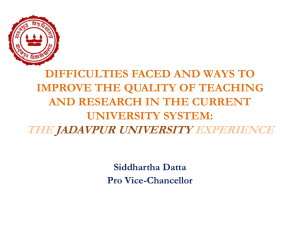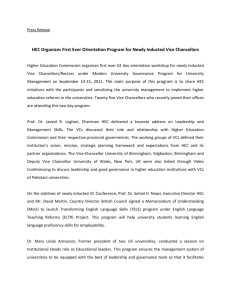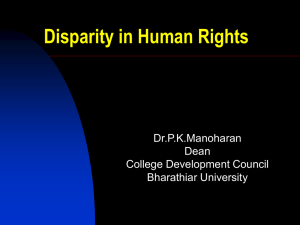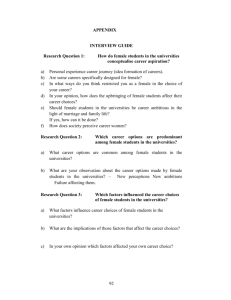SirMartinValedictoryLecture.doc
advertisement
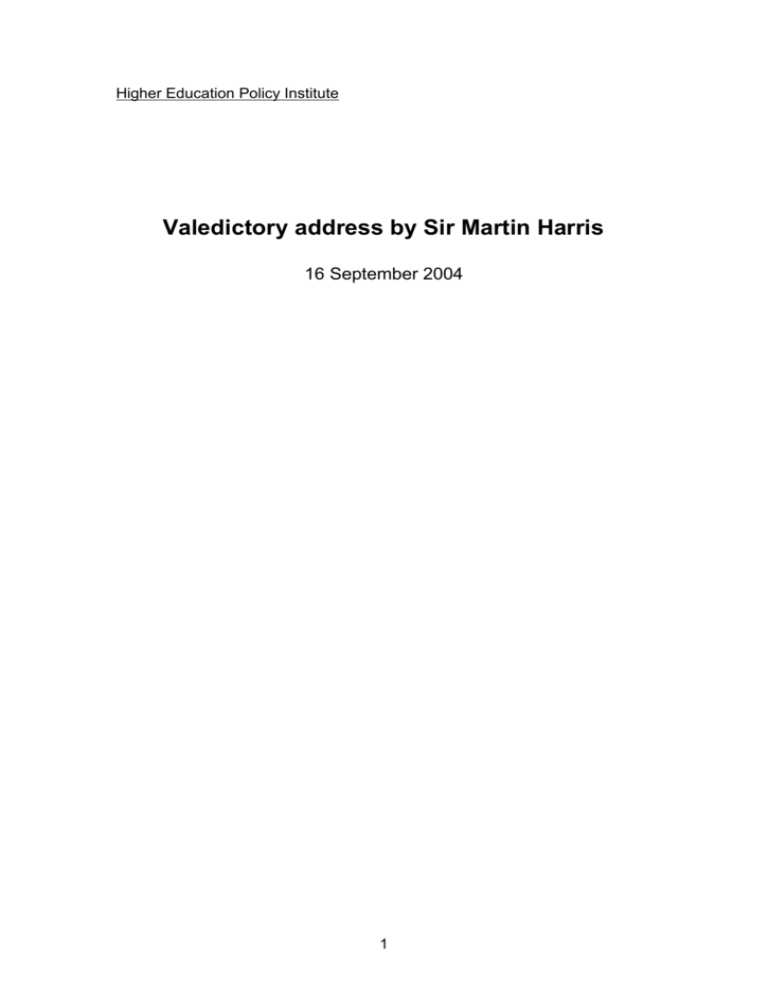
Higher Education Policy Institute Valedictory address by Sir Martin Harris 16 September 2004 1 My Lords, ladies and gentlemen, I feel genuinely honoured to have been given this opportunity to share some thoughts with you this evening, as my seventeen years as a vice chancellor come to an end. It is especially agreeable to be surrounded by so many friends as I do so, and I’d like to thank in particular Ron and Bahram for their kindness in making this evening possible. I hope you will forgive me if this evening is rather self-indulgent, indeed somewhat self-centred: it seems to me to be an occasion when this approach, which I have normally eschewed, might be acceptable to such a gathering. I hope nevertheless to make one or two more serious general points beneath the autobiographical, and I look forward to more general discussion in somewhat less than an hour’s time. It is forty two years this month since I entered the gates of my Cambridge College, sent there from a provincial grammar school as the first member of my family to be educated beyond the age of 14. The value system which I had absorbed from my family in Plymouth, a strong belief in fairness and justice from my grandparents, strongly Methodist, and the sense that everything was attainable if you worked hard enough, from my parents, was very much in accord with the spirit of the sixties, with new opportunities opening up on all sides, not least in the university system. Nevertheless, it was a profound shock for me in Cambridge in 1962 to discover for the first time, in the flesh as it were, those social class differences which underlay the social democratic world view, embracing an open and tolerant but demanding 2 meritocracy, which my parents and grandparents had imparted to me. For all that I had grown up in a politically aware environment, the battle lines of class were only very gently delineated in Plymouth in the fifties! Along with giving me immense opportunities, those Cambridge years reinforced a belief system which has remained largely unchanged through the years and which has, I hope, underpinned much of what I have sought to do. To go right to the heart of the matter first, before looking cursorily at one or two specific episodes and events, it is this background which has made me more uncomfortable than many vice chancellors with the apparent polarised choice so often posed between access and opportunity on the one hand and excellence, real excellence, on the other. For me the debate has always been about how as many young people as possible should have the chance to develop their talent to the full, some of whom – usually these days at graduate level – will in due course have the opportunity to be stretched intellectually to the highest possible level. When I hear people who should know better saying that opportunities are now extended too widely, I think back to that Plymouth boy of 42 years ago, who even a few years earlier would have been denied his place in higher education. It seems to me that that debate is simply not worth pursuing, either morally or politically (because in fact the clock can never be turned back), and that what we with responsibility within the sector should focus on is how to enhance equality of opportunity – which is emphatically not the same as equality – for our students, our staff and our institutions, without in any way sacrificing excellence where that can be attained. 3 Tonight is an occasion to be rather franker than I have felt it appropriate to be over the last twenty years or so about what seems to me to be entirely obvious: the university system is being asked to rectify at age 18 social inequalities which are often there from early childhood and which are hugely reinforced by choices made during the nursery and primary stages of education and above all at age 11 or thereabouts. The great social divide in the suburb of Manchester where my children reached secondary school age in the late seventies was, and remains, the choice made by parents between the local City of Manchester comprehensive school (which, as you will have guessed, Barbara and I chose) and the variety of independent schools that are also available. I am as struck today as I was then by the fact that friendships and social networks that had developed throughout primary school always weakened and were often ultimately wholly lost as a result of the choices that were made by parents at that stage, invariably with the best of intentions for their own children. I observe too that this sits alongside the fact that certain state schools, especially in inner cities, are not able or willing – often for reasons which are difficult to overcome – to stretch their ablest pupils so that they can begin to climb the meritocratic ladder. The ladder in my view is still very much in place, but it is perhaps harder for some and easier for others – relatively speaking – to begin the ascent. To remedy that at 18 is far from easy. When I hear those with influence say that there are no state schools, in, for example, vast swathes of London fit for their children, I am anxious – and I am anxious whether than assertion is true or not – for the goal 4 of making real that equality of opportunity which was so central to the university system of my early years in the university profession. This matters because a relative lack of equality of opportunity within the school system makes it harder to reconcile within our sector the two parallel demands that are, rightly, placed on it: the need for fair access and the need for advanced learning and research of the highest quality to be taking place within the UK higher education system. I have no difficulty at all with the view that says that, certainly by 18, some young people will have developed skills and aptitudes which differ from those of their peers; nor, unsurprisingly, do I have a problem with the view that expensive research facilities should be used by those, whether staff or students, who have demonstrated – and continue to demonstrate – the strongest propensity to take best advantage of them. The issue for me, as you will have guessed by now, is whether our ways of educating school pupils, and our ways of determining the distribution of university funding, actually achieve the meritocratic principles which they claim to do, and which I unashamedly support. True academic excellence is not about equality, any more than are great musical or sporting talents – but a meritocracy requires that access to all levels, including the very highest, is available on merit, not on circumstances of schooling or, even worse, of family income. My University is wholly committed to an ambitious programme of targeted access and widening participation, which I have strongly and proudly supported – but it is tinkering at the edges of a set of interrelated issues of fairness which, despite some very recent efforts, neither society nor the media are seemingly willing seriously to address. To be blunt, the chance which was 5 given to a boy in Plymouth in 1955 would not necessarily be available to a boy or girl of comparable income and from a comparable neighbourhood today. Let me stick my neck out a little bit further. When I was appointed to the North West Development Agency, the senior civil servant responsible said to me laughingly that it was a long time since he had appointed anyone so resolutely ‘Old Labour’ to such a position. While we both know that this is in no way a comprehensive categorisation of my views or indeed of my actions over the last two decades, what he said does reflect what for me remains an important truth: that class underlies almost all the inequalities and unfairnesses in our system, and that to focus unduly on any other variable, whether gender or ethnicity or whatever, is to lose sight of what actually makes a meritocracy difficult to attain in practice. I vividly remember canvassing years ago in an area where the ethnic mix was changing, and being asked by an aggressive voter how I would like a neighbour from a different ethnic group. My response was that we had such a neighbour, and that our families got on extremely well together. “I bet he’s a doctor,” said my interlocutor – and of course, he was. Put in blunt language, in a middle class suburb, class overrides other variables – and conversely, most of those apparently losing out by virtue of their gender or ethnicity are in fact suffering by virtue of social disadvantage of a very traditional kind. I’m not talking about thirty, forty or fifty years ago, when earlier prejudices obviously still had some force, I’m talking about now – and to me, the patterns in prosperous contemporary Manchester on the one hand, or in less fortunate Oldham and Burnley on the other hand, are as clear as they have ever been. Until we 6 tackle this issue at its roots, everything else is, in the last analysis, a distraction. And to apply this last point in the specific context of a university, within the current legal framework, how does one justify, if one is so minded, giving preference for entry to a hugely oversubscribed medical school (and I deliberately polarise my example) to a white working class male from a socially deprived background who has underachieved when there is a pool of immensely talented British Asian female applicants all with at least three ‘A’ grades predicted or attained? Our current policy is to pretend that no such dilemma exists and that the Daily Tabloid and/or m’learned friends will involve themselves with another institution: hardly a long-term solution, if truth be told. So there can be absolutely no misunderstanding, let me reiterate: access to university should be on merit (including aptitude) alone. To discriminate against any candidate on any other basis whatsoever would be intolerable. But to operate such a policy so that meritocratic principles are honoured in reality may well require the sensitive consideration of covert characteristics of applicants, in particular their family background and their schooling, rather than more overt characteristics enshrined in legislation. I believe this issue needs to be tackled openly and head on and I trust that the Schwartz Committee’s recommendations will begin this process. But to revert to my narrative: what an opportunity it was in the mid-sixties to enter a career which, for all its inevitable frustrations at times and one or two truly horrendous moments, has been deeply satisfying. In fact, of course, it has been a multiple career, with different stages often partly overlapping. I had no concept of any of this back in 1962, just a wish to become a teacher. 7 The Robbins expansion opened up university teaching as a career, and Cambridge had whetted my appetite for thinking beyond what others had already thought, or at least had written. In other words, a teaching and research career suddenly became possible. It seems unimaginable now, but a fully publicly funded PhD in 1965 led directly to a lectureship in Leicester in 1967 where, in the post-Robbins flush of enthusiasm, first, staff were appointed, then a building built, then (rather small numbers of) students admitted, in that order. But it was Leicester that also taught me something which I am still uncomfortable to see at times being questioned or even set aside, namely that ones own research and to a considerable extent ones teaching too are, or should be, autonomous. (I’ll talk about institutional autonomy briefly later.) I’m clear what a privilege that was, and that while the advice and guidance of senior colleagues in the field was invaluable, in the end, the ideas and their expression are your own, for you to be judged by. I am only too conscious of the borderline between personal autonomy for academics and the need to have institutional teaching and research goals (and a balanced budget!) – but (to go back to my meritocratic ladder) I am absolutely clear that the ablest men and women in the two universities I have led were more than capable of setting their own agenda and, in so doing, genuinely advancing human knowledge and understanding. Such people must always have those opportunities. The other aspect of university life which struck me as wonderful was the very aspect which the great majority of my fellow academics are apt to shy away from: the capacity to become involved, at ever higher levels, in formulating 8 policy for Department, for Faculty, for University. Last summer, when Leicester very generously gave their erstwhile rather troublesome young lecturer in French linguistics an Honorary Degree, I was moved to express astonishment and genuine gratitude that that University in the late sixties granted such latitude to a very bumptious young man, who wanted to change the world. In most other careers, then and now, this would not have been an asset and might indeed not have been tolerated. That too was a lesson I learned early and have sought to maintain throughout my career, often well beyond what some of my senior colleagues have though wise. The expression of uncomfortable, provocative or even plain barmy views by a tiny number seems to me to be a price universities need to pay for sustaining an environment in which this freedom is used by the great majority of colleagues to much more positive effect. Provided that, at the very end of the day, managers can manage – and that’s a very important proviso – personal academic freedom and self-motivation are something leaders of universities, it seems to me, must treasure. Let me, if I may, make two serious points from among the many reflections which occur to me after a lifetime in this great profession. Firstly, it is in my view absolutely essential that all universities should have some uncommitted money. There is in my experience no way that sticks bring about change in universities (or at least not change for the better); conversely, carrots of the right kind bring about change with quite astonishing speed. Not to put too fine a point on things, bribery works. I could give scores of examples, but I’ll just give one which you’ll all recognise. When what turned out to be the crunch 9 point for Manchester on my watch came in 1996, with the relatively weak RAE results in that year, the fact that we had the resources to invest in new appointments rather than simply shedding some of the old made it pretty easy to get the overwhelming majority of staff to sign up to the major restructurings that were necessary, which in turn led to the sharp recovery in the University’s fortunes which has subsequently become apparent. Without that free money, I fear that the best colleagues might have left and an incipient downward cycle might have become very hard to reverse, a pattern not unknown elsewhere in the sector. My point is that, in a university system where the principal funder remains the government (and I don’t propose to address that topic this evening), the algorithm that is used to distribute funds must give local institutional leadership enough unearmarked resource to manage change and to fund innovation (and I don’t mean just or even mainly in research, by the way). Despite the rhetoric, this is not always presently so. The recent HEIF exercise, originally conceived explicitly to provide secure funding for all institutions to build a solid base in third stream activities, is a case in point. What is achieved by denying adequate funding under this heading to certain institutions (especially when the opposite was clearly promised) especially if there is not sufficient flexibility in their overall funding for that activity to be sustained temporarily by cross-subsidy or whatever? All institutions fail occasionally, relatively or absolutely, in some strand of their activities, as Manchester did in the 1996 RAE; all institutions need at times to change direction or to develop an incipient strength to the point where it becomes self- 10 sustaining; but not all institutions have that little bit of financial flexibility which enables them to invest as they judge appropriate, taking the rough with the smooth. As a long standing observer of the sector as a whole, and no doubt having been seared by being Pro Vice Chancellor in Salford in 1981, when that University was faced by the unimaginable blow of a 44% budget cut, I have so often seen the damage which can be caused by reactions to shortterm financial pressures, when no reasonable way forward can be afforded within with the time available. How proud I am that my last year in office has ended with a 4% surplus on turnover, something which has been my goal for many years. The second point is, to me at least, the most important thought I want to share with you this evening. I spoke earlier about individual autonomy, the concept of academic freedom. Even more important – because it is the only way of guaranteeing academic freedom – is the principle of institutional autonomy, the freedom for local leadership to set and be accountable for policies within an available budget, without any form of direct intervention by government or any of its agencies. I am not going to discuss how, internally, this autonomy is exercised: the question of the relationship between the vice chancellor and his team, the academics who actually make the University what it is, and the governing body is itself a complex one, and one on which my views are, I think it’s fair to say, extremely traditional (though, as recent events in respect of the Manchester merger have shown, none the less successful for that!). What I do want to urge above all on my successors as vice chancellors, is that universities are autonomous, Parliament has frequently upheld this principle 11 (and, paradoxically you may feel, at least while the Lords exist, will continue to do so), and we surrender it at our peril. Of course I’m not suggesting that broad lines of government policy – fair access, increased numbers of doctors and dentists, support for regional economic strategies, whatever – should be ignored; that would be both wrong and foolish. But the endless, often insidious, detailed attempts to influence universities, often by those who are not in reality reflecting the explicit, considered view of a Funding Council, let alone of Ministers or senior civil servants, must be resisted or simply ignored. It would be invidious this evening to give examples since this would be to personalise matters quite inappropriately, but I am clear that these pressures are there and must, and crucially can, be resisted. Nowhere in the world are truly excellent universities managed by government or their agencies – and it is fascinating to me to watch as China, the country outside the UK which I know best, seeking to create initially a small number of world class universities, is moving firmly down what is for them very much the autonomy road. That autonomy, however exercised, underpins our capacity as a sector to vary, to excel and to innovate. Universities need to be eternally vigilant and to take their courage in both hands: it can and will pay off. One small footnote. I don’t propose to talk this evening about the new Manchester University. I’ve done that in other fora and it’s now for Alan Gilbert, John Garside’s and my successor, to take matters forward. What I will just say is that it has astonished colleagues in many countries around the world to learn that ‘government’, in all its guises, neither sought, nor could have vetoed, what the two universities agreed to do. Of course – let me not 12 be absurdly disingenuous – political and civil service support has been invaluable in a whole variety of ways in creating a climate in which the decision became not only possible but in the end inevitable. Nevertheless, it is important to record the fact – and not just rhetorically – as to where decisions (rightly) lay. Two autonomous institutions, using their own processes and procedures, decided to become one: others chose to help. Let me as I move towards a conclusion turn to less serious matters. I have often been asked what were the key moments in my career. Since those who helped me become established as an academic are sadly no longer with us, I will pass over the first part of my professional life and talk only of the second. Ironically, it was the devastating budget reductions announced for Salford University in July 1981 which, as events transpired, gave me the first crucial opportunity to begin to develop the national role which has given me so much pleasure over so many years. John Ashworth’s reaction to those cuts, as the University’s Vice-Chancellor, was to raise Salford’s profile to the greatest possible extent – and as one of his Pro Vice Chancellors, I was of course part of this process. Lobbying the UGC both privately and through the media was one of my duties, and this I did with enthusiasm. When Peter SwinnertonDyer replaced Ted Parkes as Chair of UGC, and came on a Visitation to Salford, I was part of the home team. Suffice it to say that as one of the UGC members, Pat Harvey, a linguist, was about to leave the UGC, there was a vacancy and it clearly seemed to Peter that someone suitable from Salford might be appointed in his place. (The processes were rather simpler in those 13 days.) Although I only learned officially of this decision many months later, John Ashworth’s driver, who had taken Peter and Norman Hardyman back to the Airport that evening, told me of the ‘decisions’ the very next morning! (There’s a lesson in there somewhere…) Incidentally, years later, Norman (who became a good friend) told me that if my angry letters to the UGC in 1981/1982 had been offensive in any way (and some from colleagues certainly were), I would not have been appointed – yet another lesson, perhaps. Anyway, working for Peter for 4 ½ years really underpinned much of what happened thereafter. Once Peter decided you were up to it, whatever ‘it’ was, you were given a degree of autonomy and of support which I had never before experienced, which gave one the confidence to operate at a national level in a way offered to few Pro Vice Chancellors. Chairing the de facto funding body for Northern Ireland for six years was hugely satisfying, and is still bringing its rewards now nearly 20 years later, through ongoing links with the University of Ulster. And as one or two in the audience tonight could testify, it was my high profile role with the UGC which led pretty much directly to my first vice chancellorship – in Essex in 1987. So you can see that I regard Peter Swinnerton-Dyer and my UGC years as the turning point in my career. It was then too that I began a twenty year long habit of interacting regularly, with or without an ostensible reason, with senior civil servants on a whole range of issues, initially just in what is now DfES but later also in DoH and DTI/OST. I learned quickly that they usually had an 14 agenda, either from Ministers or of their own, and that working with them was the most likely way to maximise the benefits (or minimise the damage, depending on the policy in question) to the sector as a whole. Very rarely – indeed, perhaps only at the very end – was there any direct benefit to one’s own institution, but having a warm relationship with a succession of immensely talented senior staff in DfES has been both personally and professionally rewarding, on a par I would say with the relationship with the academic leaders of my own institutions. And for every tedious and pointless task – like the review of University Careers Service, where one knew in advance that nothing would happen – there were compensations, such as the UK governorship of the European University Institute in Florence. How demanding those twice yearly visits to Fiesole were… One point which I should just stress here is that, while DfES remains very much the sector’s sponsoring Department in Whitehall, the exclusive role it had even ten years ago has very much changed, particularly since 1997. The DoH and OST are now fundamentally important stakeholders for many institutions; indeed, in some cases, DoH is on a par with HEFCE as a principal funder and influencer of policy and for universities like mine, OST has become crucial. Frankly, I welcome this, so long as the championing of universities is not allowed to fall between the cracks. Just occasionally, especially in medical matters, that has seemed to me to be a bit of a risk at times, despite the best efforts of colleagues in DfES and HEFCE to keep up with ever evolving policies in respect of the NHS. This interface needs to be constantly patrolled by those who understand the agenda both of DoH and of 15 the universities and a productive dialogue must always be maintained – no easy task at times. And this gives me a chance to say how much I enjoyed my own role as Chair of UUK’s Health Committee for four years. It really has been an immense privilege to be allowed to come to grips from the mid nineties, under both Conservative and Labour governments, with a whole new agenda relatively late in my career, with the Chairmanship of CASAG, then founder membership of CHI alongside my university sector role. And this interest in Health also induced me in my final year to do the one thing I had refused to do for the whole of my career, to get involved with pay negotiations, albeit only for clinical staff, which in turn led me to work with UCEA and to understand and appreciate their role more fully. It’s difficult to imagine any career in which more varied opportunities would have arisen over so many years and right to the end of one’s career. I could go on, but I won’t. I’d just like to end with a few words of thanks. Firstly, the overwhelming majority of my fellow vice chancellors have been a real pleasure to work with. My two years as Chair of CVCP were not easy – alongside the introduction of fees, we had the whole devolution question to deal with – but the collaboration of so many colleagues, from institutions of all kinds, made those years immensely personally rewarding. And in Manchester, when I went back north in 1992, Harold Hankins, Ken Green and Tom Husband could not have been more welcoming, creating a personal network which has been sustained with John Garside, Sandra Burslem and Mike Harloe to the end, enabling real difficulties at times to be confronted and resolved in a collegial fashion. Our sector is now extremely diverse, but I 16 have always found that the bonds of friendship and respect do not correspond with the nature of the institution being led. One of the tasks I most enjoyed was the two years of mentoring new vice chancellor colleagues which traditionally fall to an ex-President of UUK, learning about nine very varied institutions and their specific problems, but also seeing how similar the challenges, and their solutions, can very often be. Yet more new friendships inevitably arose from this, and several of those colleagues are here tonight. I have watched and interacted with Peter’s successors in the ever-changing role of Chief Executive of the Funding Council. Graeme, Brian and now Howard seem to me, in their very different ways, to deserve all our thanks for arguing for, and defending, the sector’s interests, in what in my perception gets a steadily more difficult environment. The downside of a mass access higher education system – for all its overwhelming advantages – is that it is in the political spotlight in a way that I couldn’t even have imagined, even as late as the 1980s when I was on the UGC and first became a vice chancellor. The autonomy which I argued earlier belongs to individual institutions, and which must be defended by them, is harder and harder to sustain at the centre, where, perfectly properly, the political goals of Ministers are daily made apparent. Perhaps it is a simply a characteristic of reaching the point of retirement – but it does seem to me that Howard has an even harder task than his predecessors. So in conclusion, I retire from a sector dramatically different from the one I entered. All pretence at homogeneity has rightly been abandoned; instead we 17 see diversity, innovation and in general highly effective responses to constant financial and other pressures. I very much hope that the interest groups which are now inevitably and necessarily a permanent feature of our sector do not obscure the fact that universities still have much in common, some aspects of which I’ve tried to touch on this evening. To give appropriate opportunities to school leavers and adults throughout their lives, to advance learning, scholarship and research in different ways in different environments, these remain goals as worthwhile as they were when I entered the profession nearly forty years ago. I wish all my fellow vice chancellors, present and future, every success over the years to come. Martin Harris September 2004 18
